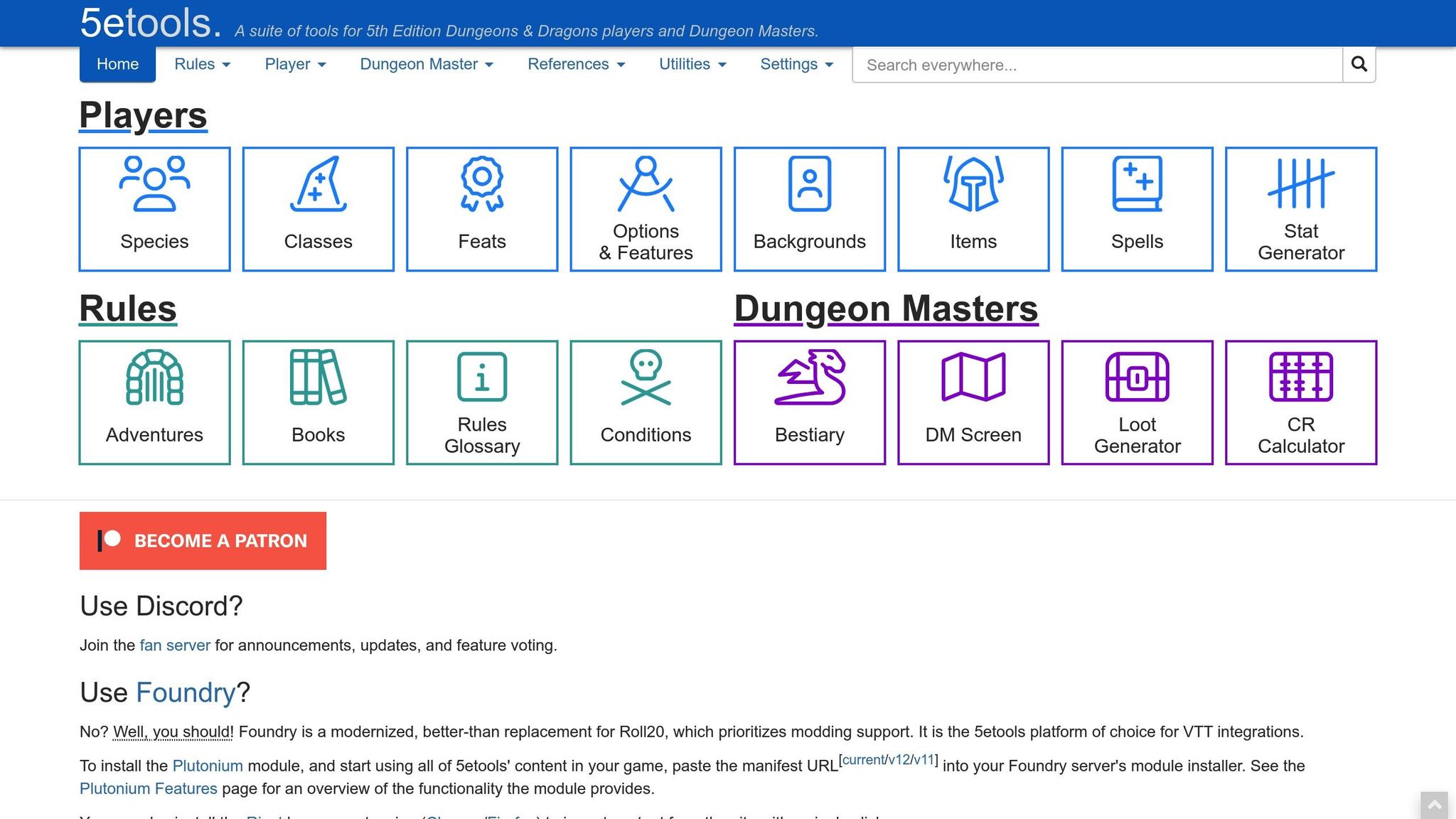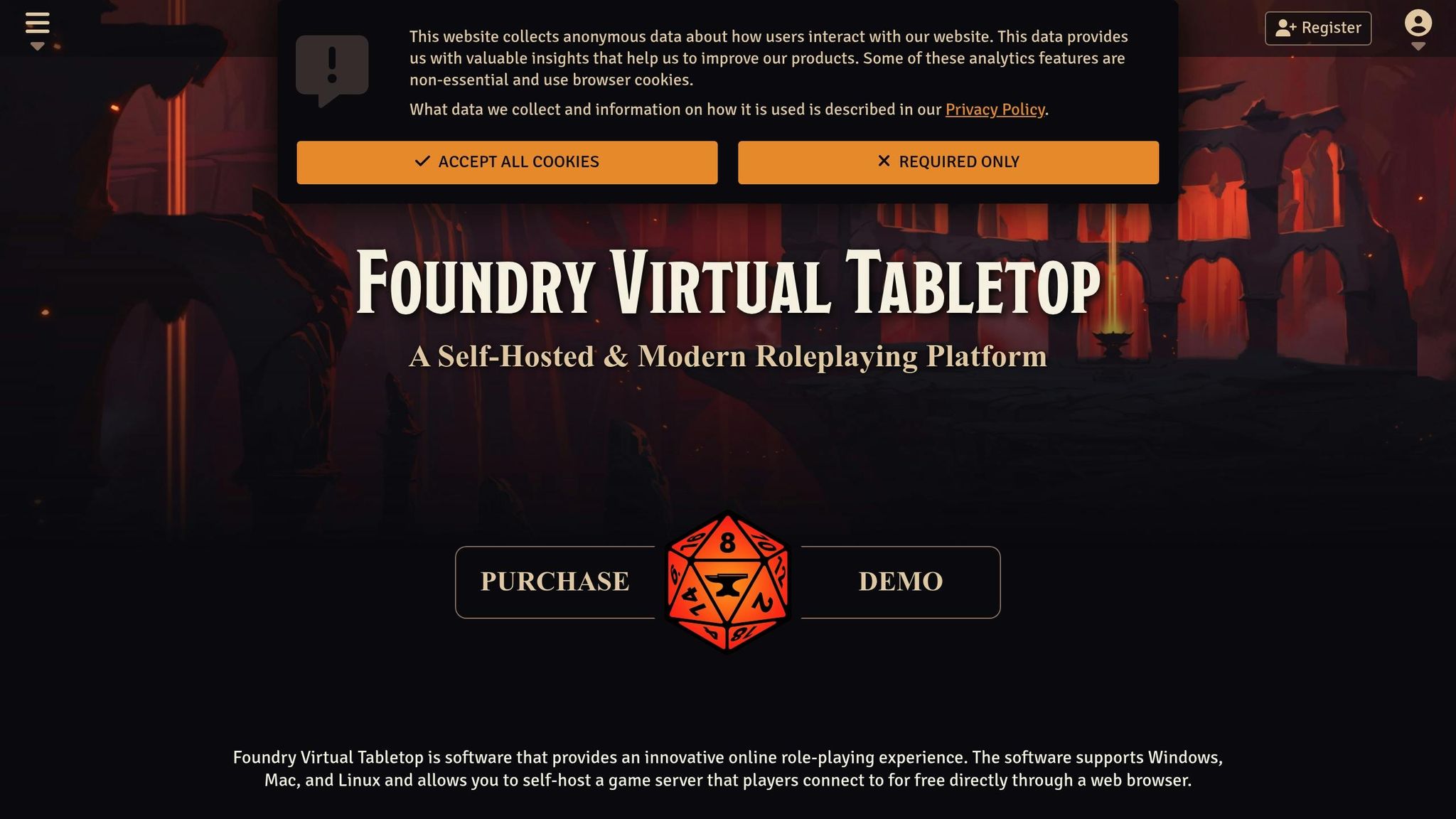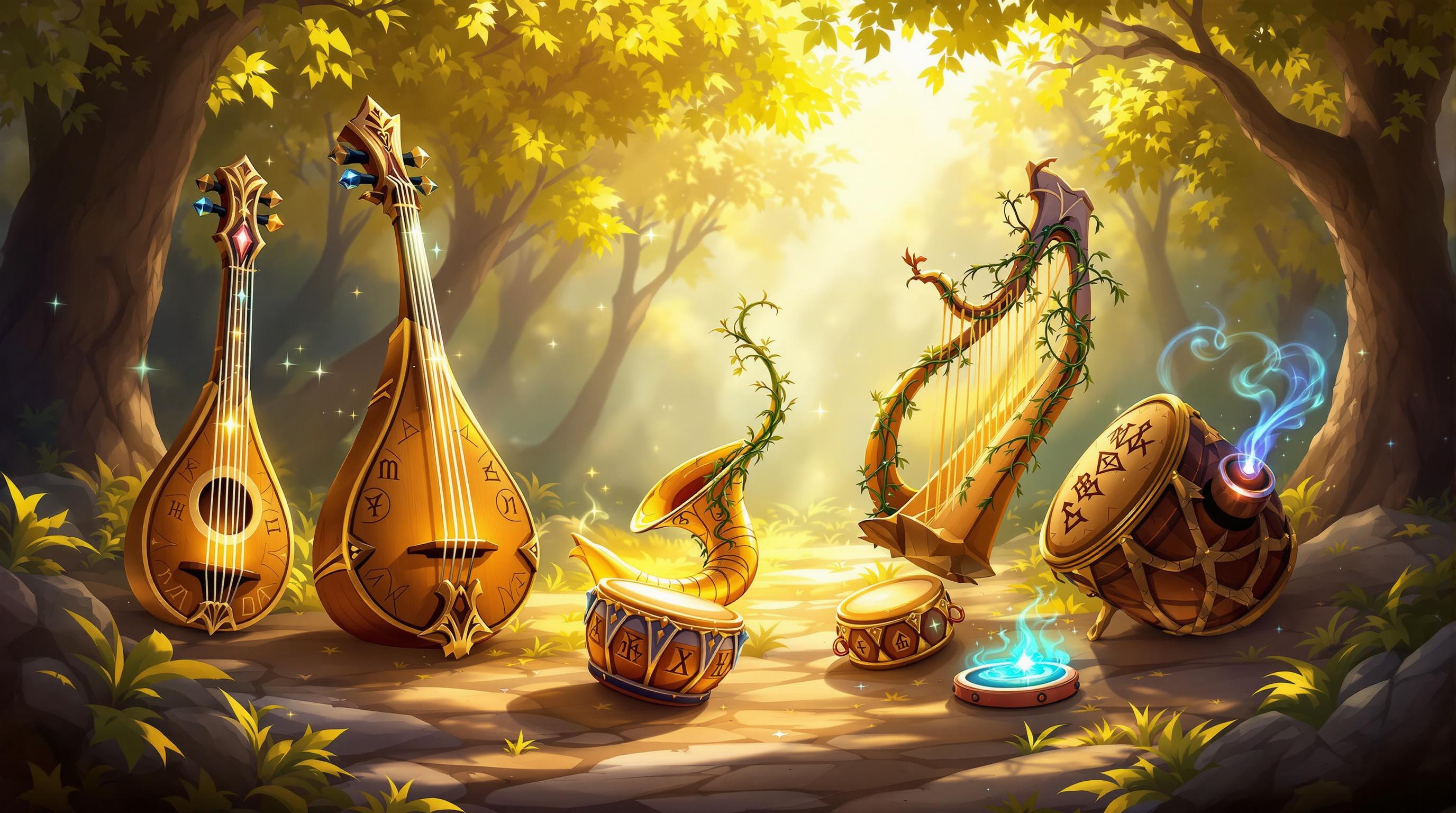Which platform is better for your D&D needs?
- D&D Wiki: Great for browsing a large variety of user-generated homebrew content. Perfect for casual players and DMs looking for quick inspiration.
- 5etools: Ideal for structured, polished content that integrates seamlessly with virtual tabletops (VTTs). Best for experienced users who value organization and compatibility.
Key Differences:
- D&D Wiki offers an open, community-driven library with mixed quality.
- 5etools provides a curated, standardized collection designed for digital campaigns.
| Feature | D&D Wiki | 5etools |
|---|---|---|
| Best For | Casual users, idea hunters | Organized players, detail-focused DMs |
| Content Volume | Large, less organized | Smaller, but well-structured |
| Learning Curve | Easy to use | Steeper, tool-focused |
| Integration | Limited | Strong VTT support |
Choose D&D Wiki for variety and creativity, or 5etools for polished, technical tools. You can even use both: explore ideas on D&D Wiki, then refine them with 5etools.
Platform Basics
D&D Wiki Overview
D&D Wiki is a community-driven site focused on homebrew content for D&D 5e. It offers a wide range of user-generated materials, such as:
- Custom character classes and subclasses
- Unique races and subraces
- Homebrew spells and magic items
- Campaign settings and adventures
- House rules and variant mechanics
Entries are refined through collaborative editing, and each homebrew page includes a discussion section where users can suggest changes or address balance concerns.
The platform uses a category-based structure for easy navigation. For instance, the "Classes" section features over 1,000 user-created options, while the "Magic Items" section hosts more than 2,500 unique items.
On the other hand, 5etools offers a more technical and structured approach.
5etools Overview

5etools specializes in managing homebrew content with a focus on integration with digital tools and virtual tabletops (VTTs). Its homebrew repository is designed for seamless use with platforms like Foundry VTT and Roll20.
Some standout features include:
- JSON-based content
- A built-in character builder
- Encounter calculators
- Advanced filtering options
- Version control for updates
Homebrew content is organized in a standardized format that mirrors official material, ensuring compatibility with tools like Foundry VTT, Roll20, and Fantasy Grounds.
| VTT Platform | Integration Features |
|---|---|
| Foundry VTT | Direct import of monsters, items, spells |
| Roll20 | Character sheet compatibility |
| Fantasy Grounds | Data conversion support |
Strict formatting rules for submissions ensure all content meets technical standards, making it easier to use in digital games. This approach balances creativity with functionality, allowing for smooth integration into virtual play environments. Next, we’ll examine how the features of these platforms compare.
Key Features Compared
Content Range and Standards
D&D Wiki and 5etools take different approaches to handling homebrew content. D&D Wiki allows open contributions, leading to a large and varied collection. On the other hand, 5etools focuses on a smaller, curated library where every submission is reviewed for compatibility with digital tools and consistent formatting.
| Feature | D&D Wiki | 5etools |
|---|---|---|
| Number of Entries | Open collection | Curated selection |
| Submission | Open | Reviewed |
| Format | Wiki articles | Standardized data |
| Quality Control | Community-driven | Technical review |
| Updates | Continuous | Versioned |
User Interface and Access
D&D Wiki features a straightforward, Wikipedia-style layout that's easy to access through any web browser. It includes category filters and tags for searching, but its extensive content can make navigation tricky at times.
In contrast, 5etools provides advanced filtering options and integrates with virtual tabletop (VTT) platforms. However, its interface has a steeper learning curve, especially for users unfamiliar with managing standardized data or digital tools. Despite this, it offers powerful tools for organizing and utilizing content.
Next, let’s take a look at the tools and features each platform offers.
Tool Support and Options
D&D Wiki offers basic tools for creating content, such as tables, stat blocks, and spell descriptions. These are sufficient for simple homebrew creations.
5etools, meanwhile, takes a more technical approach, offering features like:
- Direct imports to VTT platforms
- Built-in dice rollers and calculators
- Stat block generators
- Content creation tools with validation checks
- A version control system for tracking changes
These advanced tools make 5etools a strong choice for digital campaigns.
Foundry VTT Importing Custom Creatures

sbb-itb-b8b00a5
Platform Analysis
D&D Wiki stands out for its open approach, giving users access to a massive library of homebrew content. Its quick publishing process means there's no shortage of creative ideas to explore. However, this open system often leads to uneven quality, with some content lacking consistency.
On the other hand, 5etools takes a more controlled approach. By focusing on standardized formatting and thorough technical checks, it ensures more reliable and consistent content. The trade-off? A smaller selection compared to D&D Wiki.
The key difference between these platforms is in their focus: D&D Wiki emphasizes quantity and accessibility, while 5etools focuses on polished, dependable content. Choosing between them depends on what fits your gaming style better - whether you value a wide range of options or a more refined experience.
Best Uses for Each Platform
The documentation doesn't outline specific use cases for D&D Wiki and 5etools, but here's a breakdown based on their strengths:
D&D Wiki is perfect for sparking ideas. Its massive collection of user-generated content is ideal for those who love exploring a variety of character concepts, items, and story elements. If you're looking for inspiration or enjoy browsing through a broad range of creative options, this is the platform for you.
On the other hand, 5etools focuses on structure and consistency. It provides homebrew content in a clear, standardized format, making it a go-to for players and Dungeon Masters who want to seamlessly incorporate new elements into their campaigns without sacrificing organization.
Your choice depends on what you value more: the expansive creativity of D&D Wiki or the polished, systematic approach of 5etools.
Summary and Recommendations
Here's a quick breakdown to help you decide between these two homebrew indexes. Your choice will depend on what you're looking for and how comfortable you are with technical tools.
| Aspect | D&D Wiki | 5etools |
|---|---|---|
| Best For | Casual users, idea hunters | Organized players, detail-focused DMs |
| Content Volume | Large, less organized | Smaller, but well-structured |
| Learning Curve | Easy to use | Takes some getting used to |
| Content Quality | Mixed, user-generated | Consistently formatted |
For New Players and DMs
If you're just starting out, D&D Wiki's easy-to-navigate interface and massive library are great for finding ideas without worrying about technical complexities. Perfect for casual browsing and quick inspiration.
For Experienced Users
5etools is ideal for those who value organization and compatibility with existing game systems. Its structured design is especially helpful for DMs managing detailed campaigns or players who need quick access to specific homebrew elements.
Which Should You Choose?
Go with D&D Wiki if you want:
- Easy access to a wide variety of creative ideas
- A diverse range of community-generated content
Pick 5etools if you need:
- Content that's consistently formatted
- Advanced search features
- Better integration with official game resources
You don't have to choose just one. These platforms work well together - use D&D Wiki for brainstorming and creative ideas, then fine-tune your game with 5etools' organized tools. This way, you can match your choice to your gaming needs.


